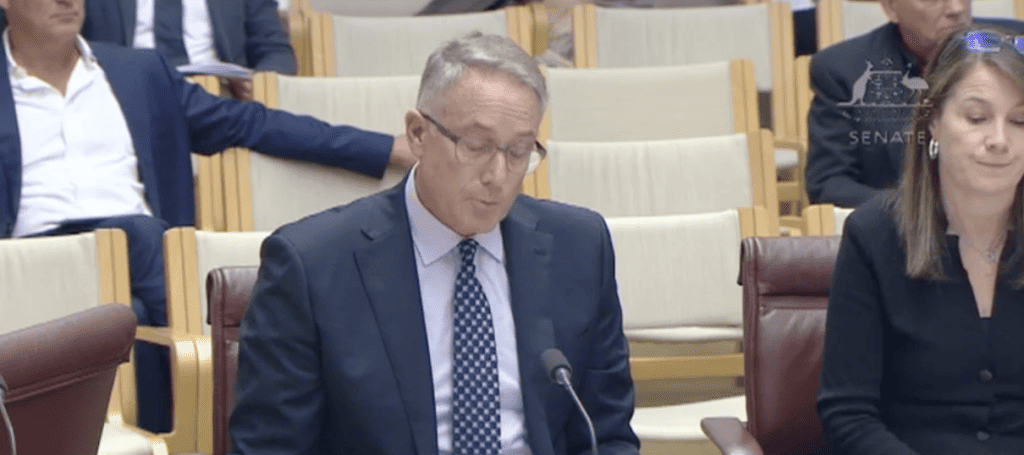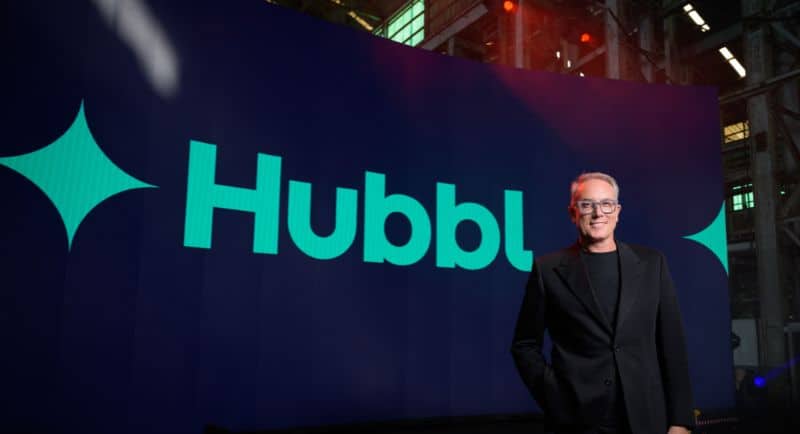The newly-launched Hubbl gives free-to-air networks prominence, without compromising or interfering with consumers’ choice, CEO Patrick Delany told a Senate committee considering proposed prominence laws on Friday.
Foxtel supports the bill, which is designed to ensure that FTA channels are easy for audiences to find on smart TVs, but disagrees with the legislation mandating that certain apps appear higher than others, either in search results or on the home screen.
“Easy access to the free to air services through our devices, like the iQ and Hubbl, is already happening,” he said.
“Prominence should be about free to air options being easily available without interfering with consumer choice and convenience. We believe customers are entitled to control their own connected TVs in the way they choose. Any proposal to alter search results and app placement to favour free-to-air services undermines customers’ right to choose.”

Delany speaking in front of the Senate committee hearing
Free-to-air bosses told the committee that currently, their BVOD apps are often buried or removed altogether.
SBS’ James Taylor said TV manufacturers have issued threats around removing SBS On Demand entirely, or from the homepage, while Network Ten’s Beverley McGarvey admitted it took her 45 minutes and the help of an engineer to find 10Play when she bought a new TV for the office, so hidden was the app.
Delany said that “no one’s search results should be left out or hidden,” but argued that Hubbl and Foxtel ensure that does not happen currently. He noted that the legislation runs the risk of legislating for the present, in which content is found through apps. It isn’t future-proofed, he continued, because as devices like Hubbl, Google Chromecast, and Amazon Fire TV Stick continue to rise in popularity, content will be increasingly found through those ecosystems instead of through individual apps.
Carolyn Hough, who appeared for Netflix alongside the streamer’s Director of Business Development Ben Cox, also “defend[ed] the rights of Australians to be in charge of their viewing choices.”
The prominence legislation was being discussed alongside anti-siphoning laws, which give FTA networks the first opportunity to bid on sports rights. Delany said it is a “dangerous” situation currently, in which “the playing field is very irregular.”
“I do want to be clear that we agree with the intent behind the policy, enshrining the right of Australians to watch truly iconic sports events for free,” he continued.
“However, we take a more nuanced approach. It’s what we call the ‘free-to-view’ model. This means ‘free access’ is no longer equated with ‘free-to -air’ broadcast licence. It would also mean events of national importance like the Bathurst 1000, the NRL and AFL grand finals are made available live, free and on a national basis, no matter the platform.”
In 2022, when Foxtel and Seven struck a $4.5bn deal to keep the AFL rights, “we couldn’t have conversations with Nine and Ten,” Delany said, because those two networks have their own streaming platforms in Stan and Paramount+, respectively.
Nine CEO Mike Sneesby proposed to the Senate committee hearing that Stan should also be covered by the prominence laws, because it is a local platform investing in local content, and voluntarily – ie without being forced to via regulations – offering functions like closed captions and audio descriptions.
In response, a senator asked Sneesby whether Nine would put all of its content on Stan should the streamer be captured by the prominence laws. Sneesby suggested it would not: “We do have to be careful that we don’t confuse the consumer proposition for [the] two platforms.”
